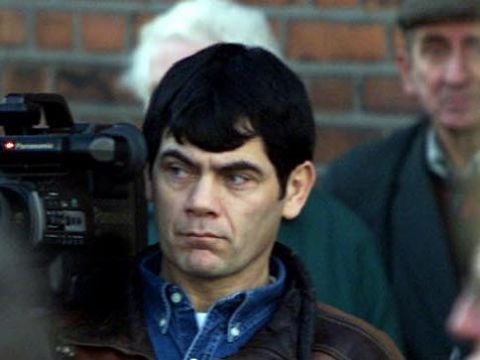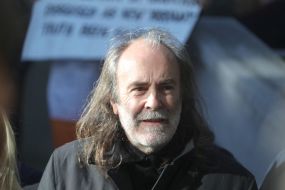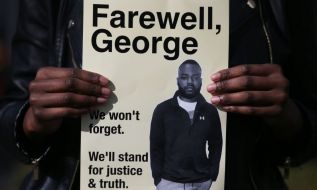An appeal aimed at halting the pending trials of Gerry Hutch and ex-Sinn Féin councillor Jonathan Dowdall before the non-jury Special Criminal Court (SCC) has been dismissed by the Supreme Court.
In a unanimous decision on Friday the five judge Supreme Court cleared the way for the two trials to proceed before the SCC.
Hutch (58), who was extradited from Spain, and former Dublin City councillor Dowdall (44), of Navan Road, Dublin, are both charged with the murder of David Byrne (33) at the Regency Hotel in Dublin on February 5th, 2016.
They deny the charges.
The men's lawyers had argued that their trials before the SCC would be unlawful because the SCC, the current version of which was established in 1972, has become a de facto permanent court when the relevant legislation only provides that it be temporary.
They were seeking to overturn an earlier High Court decision rejecting their challenge over the trials being heard before the SCC.
The High Court found the temporary/permanent argument was a political question and therefore not justiciable before a court.
If the decision to continue the SCC is made without bad faith, or absent mala fides, then the courts could not intervene, it was also found.
In its decision the Supreme Court comprised of the Chief Justice Mr Justice Donal O'Donnell, Mr Justice Peter Charleton, Ms Justice Iseult O'Malley, Mr Justice Gerard Hogan, and Mr Justice Brian Murray upheld the High Court's findings and dismissed the appeal.
'Test of performance'
Giving the Supreme Court's lead judgement the Chief Justice said that the 1939 Offences Against the State Act, under which the SCC was first set up to protect Ireland's neutrality in WW2 from being subverted, does not contain "a test of permanence," by which to gauge the lawfulness of the existence of the SCC.
The Chief Justice said the test of lawfulness of the SCC, which is contained in the law, was whether or not the Government is of the opinion that the ordinary courts are adequate to secure the administration of justice and the preservation of public peace and order.
The Chief Justice rejected the contention that the current SCC was acting outside the powers contained in the 1939 Act because it was operating as a permanent court.
He said that the applicants' interpretation of the 1939 Act, namely that a temporary lawful court could become an unlawful permanent court at some undefined point would, if correct, "be surprising."
It would be unusual for the Oireachtas to pass legislation setting up the SCC, "in such a precarious foundation, he said.
The Supreme Court also found that no duty attaches to the to Dáil Éireann to continuously review the necessity of the SCC.
The formal review process of the SCC contented for by the applicants in this case, the Chief Justice said, was not required.
The court also ruled that the Irish Human Rights and Equality Commission did not meet the legal requirements to be formally joined as an amicus curiae or friend to the court in the proceedings.
In this case the Chief Justice said, the Commission's submissions were entirely different to the claim made in the appeal and ran contrary to aspects of the applicant's case.
In a concurring judgement Mr Justice Hogan said that the SCC remains lawfully in operation as the 1972 Proclamation made by the Government, which established the current version of the SCC which was brought in during the troubles in Northern Ireland, remains in force.
The court will make a final order in relation to the costs of case.
Permanent court
The men's lawyers had argued that if the court finds the SCC is operating as a permanent court, then it is operating outside the powers provided under the Offences Against the 1939 Act.
They also claimed that there was a duty to keep the role of the SCC under review by the Government and the Dáil and if that duty has not been discharged then the court is acting outside its powers.
It was also argued the Executive and the State had misinterpreted the legislation which allows the denial of the right to trial by jury.
The Irish Human Rights and Equality Commission, which had participated in the appeal as an amicus curia (friend of the court), submitted that its substantial concern was whether the finding that the proclamation (setting up the SCC) was purely political so long as the Government held a genuine opinion that it was not impermissible.
The Commission submitted that it was fully justiciable and the power of the courts to review cannot be constrained.

Opposing the appeal, the DPP and the Minister for Justice's lawyers acknowledged the unusual nature and structure of the provision providing for the SCC in that it permits its own commencement on the basis of the circumstances as they apply at the time.
In relation to the question of the intimidation of jurors, the relevant yardstick is not whether there is intimidation but whether the ordinary courts are adequate for certain offences.
The question of whether there should be a review of the SCC, or how often a review should be held, was a purely political decision the court heard.
Lawyers for the Oireachtas, the Attorney General and Ireland, said Section 35.5 of the 1939 Act confers on the Oireachtas the right to pass a resolution to annul the SCC should it be thought to be necessary.







